Richie Cunningham is on fire
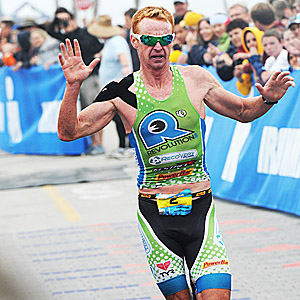
Richie Cunningham, the Australian triathlete who shares his name and red-haired look with a fictional TV star on Happy Days, is having his best season at the age of 39. Now happily ensconced in Boulder with his wife Melissa and several chickens, Cunningham is about to join the 40-plus triathlon stars like Greg Bennett and Chris Legh who are still winning big races and getting faster. With age has come an ever increasing sense of race strategy and a fearless sense of fairness which he is not shy about sharing.
Slowtwitch: In the past year you won at Rev3 Portland and Rev3 Quassy, took 2nd at New Orleans 70.3 and at Oceanside 70.3, placed 3rd at Panama 70.3, 4th at Eagleman 70.3 and took 2nd at the Asia-Pacific 70.3 Championship last December. You’ve done all this against ever deeper quality fields. At 39, are you better than ever now?
Richie Cunningham: That's the weird thing. Most people said I am having a stellar year. Which I am. It’s the best year I probably ever had. But this year is not that much better than usual. I’ve always been there [in contention]. I just don’t run around showboating, so I guess I go under the radar a little bit. Most years, most races I am on the podium. It’s just that I am moving up one or two places. There’s a lot more notoriety when you win big races like Rev3 Quassy or Portland.
ST: But not everything has been roses for you. You are on a bit of a comeback after you got injured last August?
Richie: When I injured my pelvis last year, I was having a good season. So I’ve been on good form for most of two years – I just had three or four months off.
ST: Tell us about your crash?
Richie: Last August at the Ironman 70.3 European Championships in Wiesbaden, I crashed and I fractured my pelvis. It had been raining the day before, it was a really muggy day, the roads were still wet in the mountains and there was a lot of oil on the road. I lined up for a corner and I was still going straight when I hit the [painted] white line. My front wheel went out and I hit the deck hard. At first, I didn’t think it was too bad and I managed to get back up. But when I tried to put my leg over my bike it just wouldn’t work. Finally I managed to scramble back on the bike and rode back. When I tried to go back up the other side, as soon as I tried to put power down, there was nothing. So I turned around and rode five miles back to transition with one leg. After the race I got an MRI which confirmed the break, and I flew back to Boulder
ST: By the way, why did you move from Austin to Boulder?
Richie: When I lived in Austin, I enjoyed it when I first moved there. But the way I describe it the difference is this: In Austin, you go out for a ride in a good mood and you come back in a bad mood. When you come to Boulder, you can go for a ride in a bad mood and come back in a good mood. The city of Austin is fantastic. It is a nice little oasis outside of the usual Texas and would be a great place to live after you’ve retired from the sport. But the traffic there is shitty. In Austin, I had a confrontation with angry drivers once a week. In Boulder, that happens once a year.
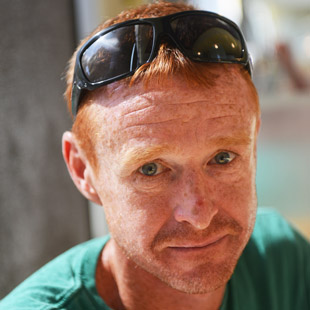
ST: How much pain were you in with a broken pelvis?
Richie: It was nasty – and ironic. Melissa [Richie’s wife] and I were attending a wedding in Boston where we met [Boston-based pro triathlete] Dede Griesbauer. She had fractured her hip in Germany two weeks earlier and I was telling her to suck it up and get back in training. I told her, ‘You’ll be back before you know it.’ I guess it was karma — I should have been more compassionate – because it happened to me the next weekend.
ST: What was the damage and how long were you out?
Richie: Roughly two months. My fracture was at the back of the pelvis – the weight bearing end — and I was on crutches for 4 weeks. The doctor in Germany is a no BS guy. He didn’t tell me to wait three months. He just said ‘If you’re in no pain, train.’ I swam for a month and then got on the bike and just rode the stationary in the gym for a few weeks and I actually came back really quickly.
ST: How long before you were in shape to race?
Richie: I stayed fresh and in mid-October I was 8th at Rev3 in South Carolina and two weeks later I got 5th at Austin 70.3. In December I had returned to form and was 2nd at the Asia-Pacific Championships at Phuket. Basically my stretch of good races started then.
ST: This year you have had some excellent wins. But over the years, you might have had many more if not for one fellow Australian?
Richie: If we took Crowie out of my life, I’d have more wins. I probably have more seconds than most people purely because of Craig Alexander. Especially in the early days.
ST: From race results, you are not a guy to run 1:09 to finish off a half Ironman. But you are a guy whose bike is strong enough that your usual 1:13 half marathon gives you a chance to win. So how important are tactics?
Richie: I think that is one of my strengths. I don’t go into races with a fixed tactic in mind. But once the race unfolds, I read it well.
ST: How fast is your run now?
Richie: My times don’t always reflect it because some of my best races have come after really tough Rev3 bike courses. But I’d say I’ve got my run down to 1:12, 1:13 now.
ST: You have always been a good runner. But it seems that you have been out dueling some great runners lately. What motivated you to improve?
Richie: My motivation to improve came when I saw the Raelerts running 1:09s, 1:10s, 1:11s and Michael Raelert at 1:11 consistently on pretty much any course. So I knew that’s where the future of this sport is. I am one of the few who can still run 1:12, 1:13 consistently. There are only 4 or 5 of us who are in that bracket.
ST: And do it consistently?
Richie: Yes. On a legit, accurately measured course, I think there are only a handful of guys who can still do 1:11s. I think that's Crowie, the Raelerts, and maybe Bevan Docherty when he goes long. Then there are another 4-5 guys including me who can consistently run 1:12, 1:13. For example, I ran a 1:13 in New Orleans [with a canceled swim] and I got 2nd there. But two years ago, if you ran 1:13 you’ll win almost every race. Now you have to run 1:13s in a small 500 point race just to get second. The sport has made a huge leap competitively in the past two years.
ST: What did you do in response?
Richie: I just tried to do things right this year. I trained early. Luckily we had a milder winter in Boulder so I was able to get a good base here.
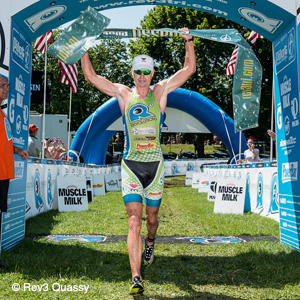
ST: Why are you self coached?
Richie: I like the freedom. Early in my career, I've trained with coaches like Col Stewart [Australian legend, father of 1990s ITU World Champion Miles Stewart]. He taught me a hell of a lot. I still use some of his methods today. He is very old school and I like that style. I don’t like much of the new hi-tech stuff. I don’t train with power [meters]. I don’t train with heart rate. Some of the guys I train with like Joe Gambles train a little bit with power. It works for them. To me, it’s interesting but it is sort of irrelevant. I like to go hard when I feel good and I go easy when I’m tired.
ST: How did you train to run better?
Richie: This year I signed up with the Boulder Track Club led by Lee Troop. It's been really good and it’s changed my approach to training a bit. Without taking anything away from swimming and biking, my running has been more of a focus. Joe Gambles has come along to with me to those workouts and he’s doing really well.
ST: So what is it about training with elite runners? Matt Reed said that is how he made a breakthrough a few years ago.
Richie: When you are running with professional runners like Lee Troop, who is a three-time Olympic marathoner for Australia, they run at a pace at which I normally do a tempo run. I’ve learned to hang on. It's also key that I put down a lot of hard work early this season. Normally I don’t get really fit by February but this year I wanted to race in Panama [where he finished 3rd behind Docherty and Armstrong].
ST: Can you take us through the strategy of some of your races this year?
Richie: At Oceanside I swam well [3rd best 24:15] and rode well [5th best 2:13:41]. Halfway through the bike leg, Jessie [Thomas], Leon Griffin and Paul Ambrose caught up. I don't race well in the cold and it was freezing. So after some back and forth, we ended up coming into transition together. Then a big group of us started the run chasing Andy Potts. We went through the first mile in about 5:10 and Jessie and Griffo and Ambrose were right there and I thought ‘Holy crap! This is going to be a tough race.’ Jessie dropped me and the rest at 6 or 7 miles. Then I thought ‘Oh shit! I can't let that go.’
ST: Were you really chasing Potts or fighting for 2nd?
Richie: Potts was a minute 20 up the road. In the first few miles, we managed to catch back up 20-30 seconds on him. But I think Andy had opened up too big a lead on the bike and had plenty in reserve for the run. Ambrose dropped back and I was going through an aid station I saw Griffo kind of stagger a little bit, so I thought, ‘OK. Let’s try to get rid of him now’ and I upped my level. The weird thing was it didn’t hurt any worse than it did running a little bit slower. I guess that is where all that running with the group started to pay off. I kept it up and I managed to catch Jessie again.
ST: Did Jessie fight back?
Richie: I knew he was a great steeplechase runner in college, so he’s got a lot of strength. I thought if I didn’t press him, he would have a great kick to come over me at the end. So I passed him with a few miles to go and tried to keep the pace high. And that’s how I managed to run away him for 2nd place. [Cunningham’s 1:13:59 run split was 5 seconds slower than Thomas’].
ST: How did it go at Quassy?
Richie: It worked out the same way against James Cunnama and Joe Gambles. James is an awesome runner and he managed to get away 10-15 seconds in transition and Joe was a little bit ahead of me as well. I caught Joe in the first mile and then we ran together for 3-4 miles. I was kind of looking at the time splits and realized once again they were a little bit slower than we needed. Joe and I hadn’t made up any time on James Cunnama in the first six seven miles, so I thought, ‘OK. I've got to try.’ Once again, I had that extra gear that I never used to have and I was able to bridge up to James and pass him. [Cunningham’s 1:15:28 run split was half a minute faster Thomas and Cunnama]
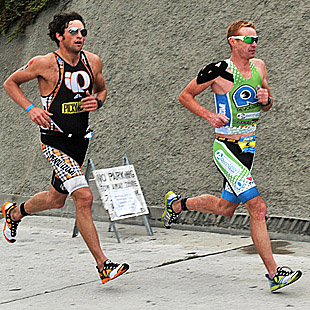
ST: You mentioned you’ve developed breathing problems. Do you have asthma?
Richie: It started at Rev3 Knoxville. It felt just like an anxiety attack in the swim. My chest went all tight and I thought I couldn’t breathe. It was cold. I was wearing ear plugs. My wetsuit felt tight. It was just a combination of all that. Basically I've had it ever since and it’s gradually gotten worse. When I do stuff in the mornings I find it’s hard to breathe and hard to get going. But I have no idea if it’s asthma.
ST: It’s amazing you are doing so well in spite of it.
Richie: It hit me in the Quassy swim after 300 meters and I had to actually do backstroke for a minute just to catch my breath. The same in Portland. After 200-300 meters, I had to back off to catch my breath. When I caught back up to the group, the same thing happened again as I settled into that pace. I just couldn’t get enough oxygen and I was off the back.
ST: So how did you come back to the lead at Portland?
Richie: I timed it to catch up at the start of the hills. I knew Barny [Paul Matthews] had gone off the front and when he does that he’s hard to catch. At Vineman, he did the same thing and went off the front with Bennett. A guy like that can open up a big lead and he’s hard to run down. So at Portland I knew I had to catch him when we hit the hills. Then we rode together.
ST: Could you keep track of the chasers on that course?
Richie: Portland is kind of a weird bike course actually. When you come back past transition at Mile 44, you have to go out again. It's another six miles out and six miles back. At the turnaround I realized that guys like Jessie Thomas were in range and it would be a hard run. I saw I only had 20-30 seconds on the group and I thought we’d have a minute or two. So that gave me a kick in the ass. The last 10k of that bike, I really dug deep and opened up a 30-second margin. That helped set me up for the run and allowed me to settle in for the first six miles.
ST: When did the challenge come?
Richie: Through Mile 7 and 8 on the run, Jessie pulled back 30 seconds. It’s a dead straight, long road and he could see me the whole time. On that section, I looked at my watch and I did the math. I was running 5:30s to 5:35s and the last four miles I put in one fast mile just to hold the gap. That made Jessie run 5:20s or better to catch me. He is a great runner and is capable of doing it. But it is so hard to do it after that bike course — and Jessie had already been chasing me for 9 miles. So I felt in control. And it was satisfying to double the last two Rev3 races.
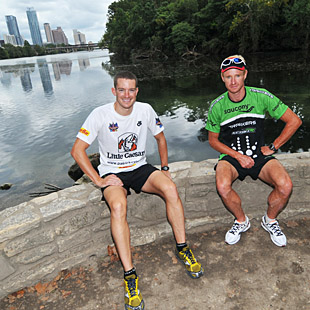
ST: What is the state of the sport?
Richie: It’s growing fast. I saw a couple of pros last week and they were complaining there are too many races. As a pro, I am baffled they even think like that. There’s another issue that affects the long term health of the sport. I am a little disappointed the way the WTC has broken the prize money down. It’s very top heavy now in 70.3 races.
ST: That's been good for you. Why are you criticizing?
Richie: I think I can criticize it objectively because right now the top heavy prize money suits me. If I was looking at it selfishly, I’d say things are great. But I don’t think it’s smart when you are traveling to a $15,000 race and they are only paying top 6. And you’ve got 10 really good guys in the field, and 7th, 8th, 9th, and 10th places aren't getting paid. The fact is that these up and coming guys are where the sport grows. I train with guys like Patrick Evoe and he and several others are very talented athletes, they are working hard and they have great potential. That 7th and 8th place money gets you the next race. To see the sport progress and stay strong it has to nurture the up and coming triathletes.
ST: There is never enough prize money, including the top rated athletes.
Richie: With the incentives the top pros get from sponsors, it doesn’t need to be that top heavy. I think from what I've heard it was the WTC’s intention to lure the top guys to all these races with prize money and a points system qualifying for the 70.3 World Championship. I don’t know if the points system is doing any good. It might attract a few better pros to a few races. But most people have their season planned out before they start.
ST: Is the modest money offered at Ironman 70.3 Worlds for the first five years not making that a drop-everything-must-race?
Richie: That was my reason last year not to do it. Honestly winning that race isn’t that much. I have finished 3rd at 70.3 Worlds twice. Yet I could go to a $50,000 race and win the same money with one-third of the quality of field there. Recently they bumped up the Ironman 70.3 World Championship prize money [from $18,000 to $35,000 for the win, from $100,000 to $200,0000 total purse] So it is getting there.
ST: Some say the most important thing about the Lance Armstrong-USADA case may be the quest for due process with USADA’s handling of drug cases. What do you think?
Richie: Right now the hearings are held behind closed doors. It’s very secretive, very tight lipped. So my question is: If no one knows what the process is, how does everyone know it is unfair? And yet everybody is turning around and complaining how unfair it is. The Lance machine is pumping out every piece of information against USADA, and USADA has stayed quiet. Whether it is good or bad, I don’t know. Right now, no one outside of the principals knows the facts. Right now a lot of people have jumped on the Lance bandwagon, saying how bad USADA is. Which in my mind is absolutely ignorant. I’ll make it perfectly clear. I’m not saying Lance is guilty or innocent. But he is under investigation and I believe it is for a reason. USADA has the duty to investigate ands prosecute. So, why is it a problem? It’s not a monopoly. He can do the Challenge Roth race. He can do Rev3. He can do XTERRA.
ST: But the WTC rules are different. Once you under investigation, you cannot race in their series.
Richie: I support the WTC 100 percent. I think it’s a great rule. If you are under investigation by the U.S. Anti-Drug Agency, there is fair chance that something is up. USADA won’t just go out willy-nilly and throw out competitors on the word of one rival.
ST: Did you like it that WTC refused to change their rules this year?
Richie: Absolutely, the time to change the rules is before the season starts. Not in the middle of the year when there is a famous person under suspicion. All the athletes, when you talk to them one on one, support a zero tolerance drug policy. And it’s not just WTC that does this. When the [Operación Puerto] Spanish drug thing came out in 2006, they banned several dozen riders from starting the Tour. Right now the US Olympic team has a similar policy. The US Olympic team standard is no world championships and no Olympics when you are under investigation. So if it is good enough for them, it is good enough for the WTC.
ST: Is it better for the sport to ban athletes before their case is tried?
Richie: When the whole thing comes out — if they find that USADA did things wrong, then criticize them. Right now it affects one person. He can’t race. But what if he were allowed to race while under investigation? Let’s say Lance won France and qualified for Kona. And with that win, he took somebody’s Kona slot. And then he went to Kona and attracted all the publicity from every single other athlete and did well. Then a month down the road, what if USADA convicts him and puts him under suspension?
ST: He can still say he never tested positive?
Richie: OK, gets suspended based on testimony and other evidence and USADA suspends him. Then, how do you erase the damage that he’d done in that time frame? Let’s say somebody like Crowie would have won Kona again but Lance comes and beats him.
ST: Is that even possible?
Richie: Let’s just say he did. Lance is good enough to challenge anybody in Kona. Then how do you give that back to the competitor who finished second? If they change the rules for Lance and he races, then it affects everybody at that race. Right now it affects one person. So I still support the WTC stance because it’s for the greater good of all the athletes.


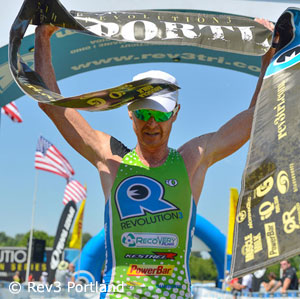
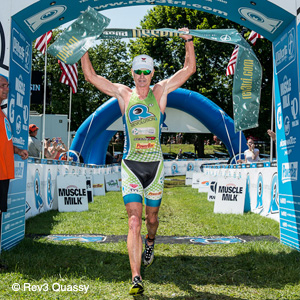
Start the discussion at slowtwitch.northend.network